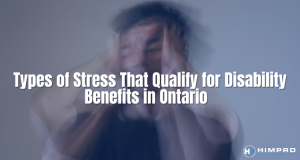 In Ontario, employees experiencing significant stress that affects their ability to work may be entitled to stress leave under the Employment Standards Act, 2000 (ESA). The ESA provides for unpaid sick leave, which encompasses personal illness, injury, or medical emergencies, including mental health issues such as stress, burnout, or anxiety.
In Ontario, employees experiencing significant stress that affects their ability to work may be entitled to stress leave under the Employment Standards Act, 2000 (ESA). The ESA provides for unpaid sick leave, which encompasses personal illness, injury, or medical emergencies, including mental health issues such as stress, burnout, or anxiety.
Eligibility for Stress Leave
To qualify for stress leave in Ontario under the ESA, an employee must have been employed by their employer for at least two consecutive weeks, regardless of whether they work full-time or part-time. Eligible employees are entitled to up to three unpaid sick leave days per calendar year. These days can be taken consecutively or individually, and any part of a day taken as leave may be counted as a full day by the employer. Three days can very quickly get used up, especially when someone is dealing with stress. When this is the case, they may need to pursue short-term disability benefits or even long-term disability benefits if the stress is prolonged.
Types of Stress That May Qualify for Leave
Stress that significantly impairs an employee’s mental health and ability to perform their job duties may qualify for stress leave. This includes, but is not limited to:
Workplace Stress: High job demands coupled with low control over the work environment can lead to harmful physical and emotional responses. This can lead to burnout, which is characterized by exhaustion, cynicism, and reduced professional efficacy.
Anxiety Disorders: It is not uncommon for individuals who have been exposed to prolonged stress to develop mental health issues such as anxiety disorders. An anxiety disorder is characterized by persistent and excessive worry that interferes with daily activities.
Depression: Another mood disorder that may qualify for stress leave in Ontario is depression, which causes persistent feelings of sadness and loss of interest, affecting daily functioning. It can be challenging to prove depression or other mental health issues when trying to receive stress leave benefits. It is typically best to speak with an experienced LTD attorney near you for advice about how to move forward with these types of claims.
Extended Stress Leave and Employer Obligations
If the standard three days of sick leave are insufficient, and the stress-related condition is considered a disability under the Ontario Human Rights Code, employers are required to accommodate the employee’s needs up to the point of undue hardship. This may include providing additional unpaid leave beyond the ESA minimum.
Employers may request reasonable documentation, such as a medical note, to substantiate the need for stress leave. However, they cannot demand specific details about the employee’s diagnosis or treatment. Employees are entitled to return to their previous position or a comparable one upon returning from leave, and are protected from any form of reprisal for taking stress leave.
Stress leave in Ontario is designed to help those who are suffering from burnout and exhaustion, however, insurance companies are notorious for denying LTD claims for stress leave and other ‘invisible’ disabilities. A denied claim can only add stress during a difficult time, which is why you need an experienced LTD lawyer on your side.
What To Do if You Are Feeling Stressed and Burnout
Understanding the types of stress that qualify for leave and the associated rights and obligations is crucial for both employees and employers in Ontario. Employees experiencing significant stress should consult with healthcare professionals and familiarize themselves with their workplace policies and applicable laws to ensure they receive the support and accommodations they are entitled to.


